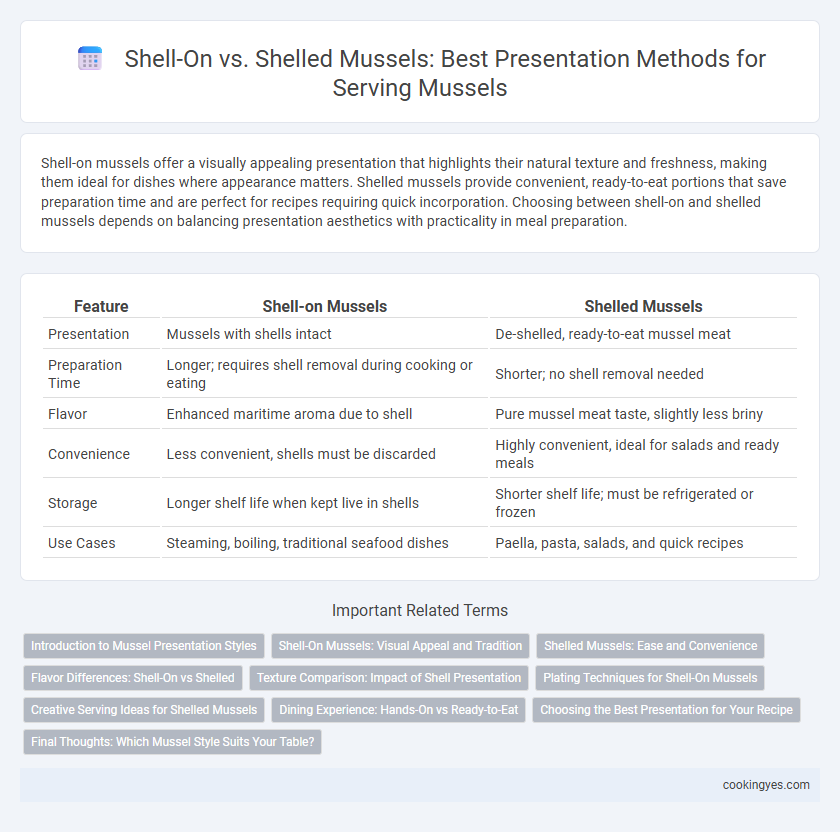Shell-on mussels offer a visually appealing presentation that highlights their natural texture and freshness, making them ideal for dishes where appearance matters. Shelled mussels provide convenient, ready-to-eat portions that save preparation time and are perfect for recipes requiring quick incorporation. Choosing between shell-on and shelled mussels depends on balancing presentation aesthetics with practicality in meal preparation.
Table of Comparison
| Feature | Shell-on Mussels | Shelled Mussels |
|---|---|---|
| Presentation | Mussels with shells intact | De-shelled, ready-to-eat mussel meat |
| Preparation Time | Longer; requires shell removal during cooking or eating | Shorter; no shell removal needed |
| Flavor | Enhanced maritime aroma due to shell | Pure mussel meat taste, slightly less briny |
| Convenience | Less convenient, shells must be discarded | Highly convenient, ideal for salads and ready meals |
| Storage | Longer shelf life when kept live in shells | Shorter shelf life; must be refrigerated or frozen |
| Use Cases | Steaming, boiling, traditional seafood dishes | Paella, pasta, salads, and quick recipes |
Introduction to Mussel Presentation Styles
Mussel presentation styles vary primarily between shell-on and shelled options, each offering distinct culinary and aesthetic benefits. Shell-on mussels retain their shells, providing an appealing visual element and natural flavor concentration, while shelled mussels offer convenience and versatility for recipes like stews and pasta. Understanding these presentation styles helps chefs optimize texture, taste, and presentation in seafood dishes.
Shell-On Mussels: Visual Appeal and Tradition
Shell-on mussels enhance visual appeal by showcasing their natural, glossy shells, which indicate freshness and quality, making them a favored choice in traditional culinary presentations. Their intact shells protect the succulent meat during cooking, preserving flavor and moisture, critical for recipes like steamed mussels or seafood platters. Displaying shell-on mussels aligns with cultural dining customs, emphasizing authenticity and a connection to seafood heritage.
Shelled Mussels: Ease and Convenience
Shelled mussels offer significant ease and convenience by eliminating the need for shell removal, streamlining meal preparation for both home cooks and professional chefs. Their ready-to-use form reduces cooking time while maintaining freshness, making them ideal for quick recipes and efficient kitchen workflows. Shelled mussels also ensure consistent portion sizes and improve presentation, enhancing their appeal in culinary applications.
Flavor Differences: Shell-On vs Shelled
Shell-on mussels retain their natural juices during cooking, enhancing a briny, ocean-fresh flavor that is richer and more complex. Shelled mussels, while convenient and faster to prepare, often lose some of their depth and intensity as the cooking liquids escape. The shell acts as a natural barrier, preserving moisture and flavor compounds, resulting in a more robust and authentic seafood taste.
Texture Comparison: Impact of Shell Presentation
Shell-on mussels retain their natural briny flavor and firmness, offering a slightly chewy texture that reflects freshness and ocean origin. Shelled mussels provide a tender, smooth bite, enhancing ease of eating while concentrating the meat's delicate taste. The presence of the shell preserves the mussel's juiciness during cooking, often resulting in a more resilient texture compared to shelled counterparts.
Plating Techniques for Shell-On Mussels
Plating techniques for shell-on mussels emphasize visual appeal by arranging shells in natural clusters or fanning them out to showcase their glossy, iridescent surfaces. Chefs often use elevated serving dishes or shallow bowls to contain broth while maintaining easy access to the shells, enhancing both flavor and presentation. Garnishing with fresh herbs or citrus wedges complements the mussels' briny taste and adds vibrant color contrasts.
Creative Serving Ideas for Shelled Mussels
Shelled mussels offer versatile serving options, including elegant seafood salads mixed with fresh herbs, citrus, and light vinaigrettes. They can be creatively incorporated into pasta dishes or seafood risottos, enhancing texture and flavor without the distraction of shells. For appetizers, shelled mussels pair beautifully with garlic butter or spicy aioli dips, making them easy to enjoy at cocktail parties or casual gatherings.
Dining Experience: Hands-On vs Ready-to-Eat
Shell-on mussels provide a hands-on dining experience, encouraging diners to engage directly by peeling and savoring the fresh, briny flavor from the shell. Shelled mussels offer convenience with ready-to-eat preparation, ideal for quick meals or recipes requiring pre-cooked seafood. Choosing between shell-on and shelled mussels depends on the desired balance of interactive dining versus ease of consumption.
Choosing the Best Presentation for Your Recipe
Shell-on mussels retain their natural juices and provide a visually appealing presentation, enhancing flavor and texture in dishes like steamed mussels or seafood boils. Shelled mussels offer convenience and quicker preparation, ideal for recipes requiring mussels to be incorporated into sauces, pastas, or salads. Selecting the best mussel presentation depends on the recipe's cooking method and desired dining experience, with shell-on suited for freshness and impact, while shelled supports ease and versatility.
Final Thoughts: Which Mussel Style Suits Your Table?
Shell-on mussels offer a rustic presentation and retain flavor during cooking, making them ideal for dishes that emphasize visual appeal and traditional preparation. Shelled mussels provide convenience and versatility, allowing for quicker meals and easy incorporation into salads, pastas, and seafood platters. Choosing between shell-on and shelled mussels depends on whether you prioritize presentation and flavor retention or speed and ease of use.
Shell-on vs Shelled for mussel presentation Infographic

 cookingyes.com
cookingyes.com